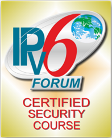Certifications
All Erion IPv6 courses are certified by the IPv6 Forum. Erion also has its own IPv6 certification programme.



IPv6 is steadily replacing IPv4 as the network protocol that underpins the global Internet. The deployment of IPv6 brings with it the need to be able to carry out forensics investigations on IPv6 networks, network devices, nodes and applications.
In this course, you will learn the fundamentals of digital forensics, network forensics and the details of how you should apply these to IPv6 networks.
You will learn the types of evidence available to you in IPv6 networks, where you can obtain it, how you should acquire it and how you can interpret it.
You will also gain experience with using a wide variety of tools to collect and analyse IPv6 evidence on networks and devices.
This course is aimed and security, forensic and law enforcement professionals responsible for forensics in modern IPv6 enabled networks.
The techniques and tools taught in this cause will also be of interest to a wider audience of networking professionals whose roles include network security and incident response.
Previous IPv6 training and experience is required. We recommend our Implementing and Securing IPv6 course.
Whilst this course focuses on IPv6, many of the techniques and tools are also equally applicable to legacy IPv4 networks.
You will practice essential IPv6 forensics techniques and carry out the analysis of a wide range of simulated incidents. Delegates undertake most lab work on Linux.
All Erion IPv6 courses are certified by the IPv6 Forum. Erion also has its own IPv6 certification programme.



Trainers are practising IPv6 consultants with extensive experience of IPv6. Further information can be found at www.erion.co.uk.
Erion is the world's leading IPv6 training company.
Our courses are available world-wide in our virtual classrooms accompanied by virtual labs. We also deliver on-site training and public training at venues around the world.
Please contact us if you are looking for training in your area.